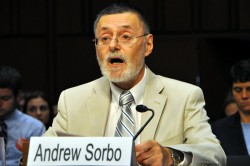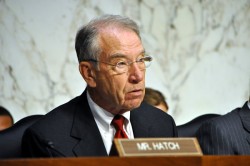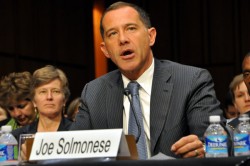National
Couples make history testifying against DOMA
Senate hears from spouses, activists about burdens of marriage ban; hearing first-ever in Congress on repeal of anti-gay law
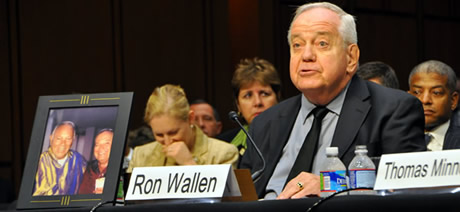
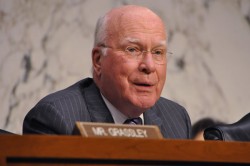
‘The time has come for the federal government to recognize that these married couples deserve the same legal protections afforded to opposite-sex married couples,’ said Sen. Patrick Leahy (D-Vt.) (Washington Blade photo by Michael Key)
A Senate hearing Wednesday on repealing the Defense of Marriage Act featured poignant testimony from couples in same-sex marriages, who described how the anti-gay law has harmed them.
The hearing, which took place before the Senate Judiciary Committee, was the first ever before Congress on repeal of DOMA, the 1996 law prohibiting federal recognition of same-sex marriage. The hearing was intended to highlight the Respect for Marriage Act, legislation pending before Congress that would repeal DOMA.
Ron Wallen, an Indio. Calif., resident, who married his partner of 55 years in 2008, said he’s unable to make payments on his home following the death of his spouse, Tom Carrollo, four months ago. Had he been in an opposite-sex marriage, he would have been able to receive Social Security benefits to help pay for the cost of living.
“I am selling the last house I shared with my husband in a panic sale because I can’t afford the mortgage and expenses,” Wallen said. “I am spending my days and nights sorting through our possessions, packing boxes to move — even while I am still answering the condolence cards that come in the mail.”
Susan Murray, who lives in Ferrisburgh, Vt., with her spouse, Karen Murray, said she also faces financial inequities as a result of DOMA. Murray was the co-counsel in the lawsuit Baker v. Vermont, which established civil unions in Vermont in 2000.
One issue Murray cited was the additional tax that she and her spouse have to pay on employer-based insurance coverage provided to them through her spouse’s employer, Fletcher Allen Health Care.
“Because of DOMA, I am not considered Karen’s spouse, so the value of that health insurance coverage for me ($6,200 a year) is considered taxable income to Karen,” Murray said. “She therefore has to pay income tax, as well as FICA and Medicare tax, on that ‘phantom’ income — unlike her other married colleagues.”
Andrew Sorbo, a Cheshire, Conn., resident and retired history teacher, also testified about financial troubles he faced after his spouse, Colin Atterbury, died of pancreatic cancer in 2009. Among other things, Sorbo said he was denied the right to be included in his deceased spouse’s medical insurance plan through the federal government.
“When I retired as a teacher in 2005, I had no alternative except to pay for my insurance coverage in full through my former school district, at a much higher cost than if I could have been covered under Colin’s plan as a spouse,” Sorbo said. “Last year, my insurance payments consumed almost a third of my $24,000 teacher pension.”
Sen. Patrick Leahy (D-Vt.), chair of the committee, spoke out in his opening statement for passage of the Respect for Marriage Act and said it would allow same-sex couples married under state law to receive federal benefits.
“Nothing in this bill would obligate any person, religious organization, state, or locality to perform a marriage between two persons of the same sex,” Leahy said. “What would change, and what must change, is the federal government’s treatment of state-sanctioned marriage. The time has come for the federal government to recognize that these married couples deserve the same legal protections afforded to opposite-sex married couples.”
Sen. Dianne Feinstein (D-Calif.), sponsor of the DOMA repeal legislation, maintained that the anti-gay law should be off the books because marriage, as well as other issues related to family such as adoption and divorce, have been under the jurisdiction of state law.
“Family law has traditionally been the preserve of state law,” Feinstein said. “The single exception is DOMA. Chief Justice [William] Rehnquist once wrote that family law ‘has been left to the states from time immemorial, and not without good reason.’ He was right.”
Passed by Congress in 1996, DOMA was signed into law by President Clinton. Both Clinton and the bill’s sponsor at the time, former Republican Rep. Bob Barr, have come out for repeal of the law.
DOMA has two components: one that prohibits the federal government from recognizing same-sex marriage and another that allows states not to recognize such marriages performed in other jurisdictions.
As a result of the component of DOMA known as Section 3, married same-sex couples cannot participate in federal programs. For instance, they can’t file joint federal income taxes, receive spousal benefits under Social Security or obtain exemptions of the estate tax law upon the death of one of the spouses.
Sen. Chuck Schumer (D-N.Y.), who represents a state where same-sex marriage will be available next week, emphasized the fiscal reasons for repealing DOMA and predicted that lifting the anti-gay law from the books “would, on balance, likely increase federal revenue.”
According to Schumer, in 2004 the Congressional Budget Office found that DOMA repeal at the time would have increased revenues by less than $400 million a year from 2005 through 2010, and by $500 million to $700 million annually from 2011 through 2014.
“I think that there are three fundamental principles at stake here,” Schumer continued. “Repealing DOMA makes good fiscal sense, it respects states’ rights to make their own determinations about marriage, and it treats all married people the same. It’s fair, it makes sense, and it’s time.”
The sole committee member to speak out against DOMA repeal during the hearing was Sen. Charles Grassley (R-Iowa), ranking Republican on the committee.
Grassley, who represents a state where same-sex marriage is legal, said he opposes the Respect for Marriage Act because he believes marriage should be reserved for one man and one woman.
“The bill before us today is entitled the Respect for Marriage Act,” Grassley said. “George Orwell would have marveled at the time. A bill to restore marriage would restore marriage as it has been known — one man, one woman. That is the view of marriage that I support. This bill would undermine, not restore marriage by repealing it.”
Grassley and Sen. Orrin Hatch (R-Utah) were the only Republican senators who made an appearance at the DOMA hearing. Grassley was the only GOP committee member who asked questions of the witnesses.
Witnesses who married someone of the same-sex testified about how DOMA negatively affected their relationship or their ability to receive benefits after the death of their spouse.
The hearing took place on the heels of an announcement from White House Press Secretary Jay Carney on Tuesday that President Obama supports the Respect for Marriage Act.
“I can tell you that the president has long called for legislative repeal of the so-called Defense of Marriage Act, which continues to have a real impact on the lives of real people families, friends and neighbors,” Carney said. “He is proud to support the Respect for Marriage Act introduced by Sen. Feinstein and Congressman Nadler, which would take DOMA off the books once and for all. This legislation would uphold the principle that the federal government should not deny gay and lesbian the same rights and legal protections as straight couples.”
President Obama has previously said he supports legislative repeal of the Defense of Marriage Act, but has yet to come out in support of the Respect for Marriage Act, which is the specific measure pending before Congress that would repeal the law.
During the hearing, Grassley erroneously said that Obama until Tuesday “was a supporter of DOMA.” During the 2008 campaign, Obama made full repeal of DOMA one of his campaign promises.
Experts testify before Senate
House members also testified on both sides of the Respect for Marriage Act. Two Democratic members — Reps. Jerrold Nadler (D-N.Y.), the sponsor of the bill, and John Lewis (D-Ga.) — favored DOMA repeal, while Rep. Steve King (R-Iowa), a lawmaker known for his anti-gay views, opposed it.
Nadler maintained that not just same-sex couples — but children being raised by LGBT parents — are among those who are affected by the discrimination of DOMA.
“No legitimate federal interest in the welfare of children is ever advanced by withholding protection for some children based on the desire to express mild disapproval of their parents,” Nadler said. “It defies common sense to claim that it’s necessary to harm or exclude the children of married same-sex couples in order to somehow protect the children of opposite-sex couples.”
Similarly, Lewis expressed disbelief that Congress has yet to act on something as fundamental as allowing Americans the right to marry the person they choose.
“I find it hard to believe that in the year 2011, there’s still the need to hold hearings and debate on whether or not to allow people to marry the one they love,” Lewis said.
Lewis said DOMA imposes similar discrimination that blacks endured in the South under segregation and recalled the discrimination he faced as a child growing up in Southern Alabama.
“As a child, I tasted the bitter fruits and racism and discrimination, and I did not like it,” Lewis said. “And in 1996, when Congress passed the Defense of Marriage Act, the taste of that old bitter fruit filled my mouth once again.”
King, countering those arguments, based his testimony against repeal of DOMA on the basis that marriage is intended for procreation and thus should be reserved for one man and one woman because the union can produce children.
“The other side argues that you can’t choose who you love and that the union between two men and two women is equal to that of one man and one woman,” King said. “These are the same arguments that are used to promote marriage between fathers and daughters, mothers and sons or even polygamous relationships.”
Expert witnesses on both sides of DOMA testified before lawmakers. LGBT advocates maintained DOMA should be repealed to lift the burden of discrimination against same-sex couples, while supporters of DOMA said the anti-gay law is necessary to keep marriage as between one man and one woman.
Joe Solmonese, president of the Human Rights Campaign, was among the LGBT advocates who testified during the hearing. He addressed the financial burdens DOMA imposes on same-sex couples.
“DOMA means that the many protections the federal government provides for the health and financial security of American families remain out of reach for same-sex couples and their children,” Solmonese said. “Same-sex spouses of federal employees and active members of the military are denied access to health insurance coverage and a host of other benefits. Even when private sector companies voluntarily provide spousal health benefits, they are taxed, making it financially burdensome if not impossible for gay and lesbian couples to make use of these fair-minded policies.”
Evan Wolfson, president of Freedom to Marry, said DOMA “carves out a gay exception” in the way the U.S. government traditionally and currently treats married couples.
“DOMA divides those married at the state level into first-class marriages for those the federal government prefers and second-class marriages for those the federal government doesn’t like,” Wolfson said. “But in America, we don’t have second-class citizens, and we shouldn’t have second-class marriages either.”
Arguing in favor of DOMA, anti-gay advocates maintained the importance of keeping marriage between one man and one woman.
Austin Nimrocks, senior legal counsel for the Alliance Defense Fund, said the purpose of family and relationships is to procreate and raise children.
“Accordingly, from the lexicographers who have defined marriage, to the eminent scholars in every relevant academic discipline who have explained marriage, to the legislatures and courts that have given legal recognition and effect to marriage, they all demonstrate that an animating purpose of marriage in every society is to increase the likelihood that procreative relationships benefit society,” Nimrocks said. “Marriage between a man and a woman is a long standing, world-wide idea that is a building block of society.”
Edward Whelan, president of the Ethics & Public Policy Center, warned that DOMA repeal could require the federal government to recognize not only same-sex marriages — but also polygamous relationships.
“If the male-female nature of traditional marriage can be dismissed as an artifact and its inherent link to procreation denied, then surely the distinction between a marriage of two persons and a marriage of three or more is all the more arbitrary and irrational,” Whelan said. “It’s doubtful that any further sliding down the slippery slope would be necessary to get to polyamory: unlike the novelty of same-sex marriage, the polygamous version of polyamory has been widely practiced throughout history — and is therefore arguably up the slope from same-sex marriage.”
Whelan previously testified in April against same-sex marriage before the Republican-controlled House Judiciary Subcommittee on the Constitution hearing on “Defending Marriage.”
The assertion that DOMA would institute same-sex marriage is places where it didn’t exist before didn’t go without criticism from LGBT advocates after the hearing.
Rick Jacobs, chair and co-founder of the Courage Campaign, rebuked the assertion during that DOMA repeal would expand the places where gay couples can marry and maintained the Defense of Marriage Act would simply remove the federal government from the marriage issue.
“They don’t seem to understand what DOMA is,” Jacobs said. “They just keep missing the point that all DOMA is give the states the ability to decide what marriage is.”
Mary Bonauto, civil rights projects director for Gay & Lesbian Advocates & Defenders, also chided anti-gay advocates’ emphasis on marriage as between one man, one woman during the hearing as she said DOMA only affects those who are already married.
“I think it’s important to talk about marriage, but I wish there had been that much more delineation between what marriage is about one hand and what DOMA does, which is simply discriminate against people who are already married,” Bonauto said. “But there’s still, particularly in the opposition witnesses, this complete conflation between DOMA and marriage.”
Tom Minnery, vice president of public policy for Focus on the Family, bore the brunt of the tough questioning from the committee undermining his credibility for his position that children reared by opposite-sex parents are better off than those raised by same-sex parents.
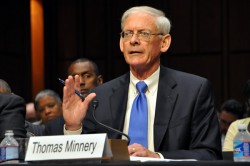
Tom Minnery, vice president of public policy for Focus on the Family (Washington Blade photo by Michael Key)
“It is a strong and dramatically consistent finding in the social science, psychological and medical literature that children do best when living with their own married mother and father,” Minnery said.
In his testimony, Minnery cites a December 2010 study from the Department of Health & Human Services which he said found “children living with their own married biological or adoptive mothers and fathers were generally healthier and happier, had better access to health care, less likely to suffer mild or severe emotional problems, did better in school, were protected from physical, emotional and sexual abuse and almost never life in poverty, compared with children in any other family form.”
Sen. Al Franken (D-Minn.) challenged Minnery’s assertion, saying the HHS report “actually doesn’t say what you said it says.”
“It says that nuclear families — not opposite-sex married families — are associated with those positive outcomes,” Franken said. “Isn’t it true, Mr. Minnery, that married same-sex couple that has or had adopted kids would fall under the definition of the nuclear family in the study that you cite?”
Minnery replied that he would believe the study means nuclear families are families with opposite-sex parents, but Franken denied this speculation, saying, “It doesn’t,” eliciting laugher from those attending the hearing.
“The study defines nuclear family as one or more children living with two parents who are married to one another and each biological or adoptive parents of all the children in the family,” Franken said. “And I, frankly, don’t really know how we can trust the rest of your testimony if you are reading studies these ways.”
Rea Carey, executive director of the National Gay & Lesbian Task Force, said following the hearing the testimony of those affected by DOMA compared to apparently misleading testimony of the anti-gay law’s proponents shows why “we’re winning on this issue.”
“The families who spoke — they talked from their human experience,” Carey said. “The other side talked from technical matters, from research that actually didn’t reveal the true, full research. We’re actually — children are doing quite well in our families, thank you very much.”
Time for a markup?
Now that the Respect for Marriage Act has had a hearing in the Senate, one option to move the legislation would be to hold a markup to bring the legislation to the floor. All 10 Democrats on the committee have signaled support for the legislation, so the bill already has sufficient support to move forward.
A Senate Democratic aide, who spoke on condition of anonymity, said the committee has yet to set a date to report out the legislation to the Senate floor.
“This hearing began to build the record for repealing DOMA, and this is the beginning of the process,” the aide said. “Sen. Leahy will continue to work with Sen. Feinstein and other supporters, and hopes there will be support from both sides of the aisle for this repeal, but I have no announcements to make today concerning any kind of timeline.”
Jacobs said he wants to see more co-sponsors for the Respect for Marriage Act — and maintained he wants “all Democrats on board” — but said the time may be right for a markup on the bill.
“I think that we should move to that pretty quickly,” Jacobs said. “I’d like to see it. I know some people don’t, but I think we need to keep the momentum going.”
Following the hearing, Solmonese expressed caution about moving to a markup and deferred the decision to the Senate Judiciary Committee leadership.
“If we are genuinely committed to a clare path to victory, to ensuring that DOMA is repealed, then I would defer to the chairman in terms of the degree to which he thinks the time is appropriate for a markup — and how that relates to a full Senate vote and the prospects in the House,” Solmonese said. “As was the case with ‘Don’t Ask, Don’t Tell,’ as was the case with any legislative victory that we have seen through to the end, we never want to evaluate it on the merits of one action.”
Bonauto, who’s leading several lawsuits against DOMA in the federal courts, said she isn’t sure if a committee vote on DOMA repeal — or a floor vote in the Senate without action in the House — would have any effect on how the courts would evaluate the constitutionality of the anti-gay law. She cautioned that a symbolic victory in the Senate may not have the desired impact on the courts.
“It’s hard to predict,” Bonauto said. “In the 1970’s, when the Congress had approved of the Equal Rights Amendment and sent it up for ratification to the states, the Supreme Court stayed its hand and didn’t declare that gender was a suspect classification because it thought the issue was moving through the political process. I think we’ve all learned through of the failure of ratification of the ERA that because something has been approved by the Congress of even is a constitutional amendment is set forth for ratification, it doesn’t predict future results.”
Kansas
ACLU sues Kansas over law invalidating trans residents’ IDs
A new Kansas bill requires transgender residents to have their driver’s licenses reflect their sex assigned at birth, invalidating current licenses.

Transgender people across Kansas received letters in the mail on Wednesday demanding the immediate surrender of their driver’s licenses following passage of one of the harshest transgender bathroom bans in the nation. Now the American Civil Liberties Union is filing a lawsuit to block the ban and protect transgender residents from what advocates describe as “sweeping” and “punitive” consequences.
Independent journalist Erin Reed broke the story Wednesday after lawmakers approved House Substitute for Senate Bill 244. In her reporting, Reed included a photo of the letter sent to transgender Kansans, requiring them to obtain a driver’s license that reflects their sex assigned at birth rather than the gender with which they identify.
According to the reporting, transgender Kansans must surrender their driver’s licenses and that their current credentials — regardless of expiration date — will be considered invalid upon the law’s publication. The move effectively nullifies previously issued identification documents, creating immediate uncertainty for those impacted.
House Substitute for Senate Bill 244 also stipulates that any transgender person caught driving without a valid license could face a class B misdemeanor, punishable by up to six months in jail and a $1,000 fine. That potential penalty adds a criminal dimension to what began as an administrative action. It also compounds the legal risks for transgender Kansans, as the state already requires county jails to house inmates according to sex assigned at birth — a policy that advocates say can place transgender detainees at heightened risk.
Beyond identification issues, SB 244 not only bans transgender people from using restrooms that match their gender identity in government buildings — including libraries, courthouses, state parks, hospitals, and interstate rest stops — with the possibility for criminal penalties, but also allows for what critics have described as a “bathroom bounty hunter” provision. The measure permits anyone who encounters a transgender person in a restroom — including potentially in private businesses — to sue them for large sums of money, dramatically expanding the scope of enforcement beyond government authorities.
The lawsuit challenging SB 244 was filed today in the District Court of Douglas County on behalf of anonymous plaintiffs Daniel Doe and Matthew Moe by the American Civil Liberties Union, the ACLU of Kansas, and Ballard Spahr LLP. The complaint argues that SB 244 violates the Kansas Constitution’s protections for personal autonomy, privacy, equality under the law, due process, and freedom of speech.
Additionally, the American Civil Liberties Union filed a temporary restraining order on behalf of the anonymous plaintiffs, arguing that the order — followed by a temporary injunction — is necessary to prevent the “irreparable harm” that would result from SB 244.
State Rep. Abi Boatman, a Wichita Democrat and the only transgender member of the Kansas Legislature, told the Kansas City Star on Wednesday that “persecution is the point.”
“This legislation is a direct attack on the dignity and humanity of transgender Kansans,” said Monica Bennett, legal director of the ACLU of Kansas. “It undermines our state’s strong constitutional protections against government overreach and persecution.”
“SB 244 is a cruel and craven threat to public safety all in the name of fostering fear, division, and paranoia,” said Harper Seldin, senior staff attorney for the ACLU’s LGBTQ & HIV Rights Project. “The invalidation of state-issued IDs threatens to out transgender people against their will every time they apply for a job, rent an apartment, or interact with police. Taken as a whole, SB 244 is a transparent attempt to deny transgender people autonomy over their own identities and push them out of public life altogether.”
“SB 244 presents a state-sanctioned attack on transgender people aimed at silencing, dehumanizing, and alienating Kansans whose gender identity does not conform to the state legislature’s preferences,” said Heather St. Clair, a Ballard Spahr litigator working on the case. “Ballard Spahr is committed to standing with the ACLU and the plaintiffs in fighting on behalf of transgender Kansans for a remedy against the injustices presented by SB 244, and is dedicated to protecting the constitutional rights jeopardized by this new law.”
National
After layoffs at Advocate, parent company acquires ‘Them’ from Conde Nast
Top editorial staff let go last week

Former staff members at the Advocate and Out magazines revealed that parent company Equalpride laid off a number of employees late last week.
Those let go included Advocate editor-in-chief Alex Cooper, Pride.com editor-in-chief Rachel Shatto, brand partnerships manager Erin Manley, community editor Marie-Adélina de la Ferriére, and Out magazine staff writers Moises Mendez and Bernardo Sim, according to a report in Hollywood Reporter.
Cooper, who joined the company in 2021, posted to social media that, “Few people have had the privilege of leading this legendary LGBTQ+ news outlet, and I’m deeply honored to have been one of them. To my team: thank you for the last four years. You’ve been the best. For those also affected today, please let me know how I can support you.”
The Advocate’s PR firm when reached by the Blade said it no longer represents the company. Emails to the Advocate went unanswered.
Equalpride on Friday announced it acquired “Them,” a digital LGBTQ outlet founded in 2017 by Conde Nast.
“Equalpride exists to elevate, celebrate and protect LGBTQ+ storytelling at scale,” Equalpride CEO Mark Berryhill said according to Hollywood Reporter. “By combining the strengths of our brands with this respected digital platform, we’re creating a unified ecosystem that delivers even more impact for our audiences, advertisers, and community partners.”
It’s not clear if “Them” staff would take over editorial responsibilities for the Advocate and Out.
Federal Government
Two very different views of the State of the Union
As Trump delivered his SOTU address inside the Capitol, Democratic lawmakers gathered outside in protest, condemning the administration’s harmful policies.

As President Donald Trump delivered his State of the Union address inside the U.S. Capitol — touting his achievements and targeting political enemies — progressive members of Congress gathered just outside in protest.
Their message was blunt: For many Americans, particularly LGBTQ people, the country is not better off.
Each year, as required by Article II, Section 3 of the Constitution, the president must “give to the Congress Information of the State of the Union.” The annual address is meant to outline accomplishments and preview the year ahead. This year, Trump delivered the longest State of the Union in U.S. history, clocking in at one hour and 48 minutes. He spoke about immigration, his “law and order” domestic agenda, his “peace through strength” foreign policy doctrine, and what he framed as the left’s ‘culture wars’ — especially those involving transgender youth and Christian values.
But one year into what he has called the “Trump 2.0” era, the picture painted outside the Capitol stood in stark contrast to the one described inside.
Transgender youth
In one of the most pointed moments of his speech, Trump spotlighted Sage Blair, using her story to portray gender-affirming care as coercive and dangerous. Framing the issue as one of parental rights and government overreach, he told lawmakers and viewers:
“In the gallery tonight are Sage Blair and her mother, Michelle. In 2021, Sage was 14 when school officials in Virginia sought to socially transition her to a new gender, treating her as a boy and hiding it from her parents. Hard to believe, isn’t it? Before long, a confused Sage ran away from home.
“After she was found in a horrific situation in Maryland, a left-wing judge refused to return Sage to her parents because they did not immediately state that their daughter was their son. Sage was thrown into an all-boys state home and suffered terribly for a long time. But today, all of that is behind them because Sage is a proud and wonderful young woman with a full ride scholarship to Liberty University.
“Sage and Michelle, please stand up. And thank you for your great bravery and who can believe that we’re even speaking about things like this. Fifteen years ago, if somebody was up here and said that, they’d say, what’s wrong with him? But now we have to say it because it’s going on all over, numerous states, without even telling the parents.
“But surely, we can all agree no state can be allowed to rip children from their parents’ arms and transition them to a new gender against the parents’ will. Who would believe that we’ve been talking about that? We must ban it and we must ban it immediately. Look, nobody stands up. These people are crazy. I’m telling you, they’re crazy.”
The story, presented as encapsulation of a national crisis, became the foundation for Trump’s renewed call to ban gender-affirming care. LGBTQ advocates — and those familiar with Blair’s story — argue that the situation was far more complex than described and that using a single anecdote to justify sweeping federal restrictions places transgender people, particularly youth, at greater risk.
Equality Virginia said the president’s remarks were part of a broader effort to strip transgender Americans of access to care. In a statement to the Blade, the group said:
“Tonight, the president is choosing to double down on efforts to disrupt access to evidence-based, lifesaving care.
“Rather than allowing families and doctors to navigate deeply personal medical decisions free from federal interference — or allowing schools to respond with nuance and compassion without putting marginalized children at risk — the president is instead advocating for reckless, one-size-fits-all political control.
“At a time when Virginians are worried about rising costs, economic uncertainty, and aggressive immigration enforcement actions disrupting communities and families, attacking transgender young people is a blatant political distraction from the real challenges facing our nation. Virginia families and health care providers do not need Donald Trump telling them what care they do or do not need.”
For many in the LGBTQ community, the rhetoric inside the chamber echoed actions already taken by the administration.
Earlier this month, the Pride flag was removed from the Stonewall National Monument under a National Park Service directive that came from the top. Community members returned to the site, raised the flag again, and filed suit, arguing the removal violated federal law. To advocates, the move was symbolic — a signal that even the legacy of LGBTQ resistance was not immune.
Immigration and fear
Immigration dominated both events as well.
Inside the chamber, Trump boasted about the hundreds of thousands of immigrants detained in makeshift facilities. Outside, Democratic lawmakers described those same facilities as concentration camps and detailed what they characterized as the human toll of the administration’s enforcement policies.
Sen. Ed Markey (D-Mass.), speaking to the crowd, painted a grim picture of communities living in fear:
“People are vanishing into thin air. Quiet mornings are punctuated by jarring violence. Students are assaulted by ICE agents sitting outside the high school, hard working residents are torn from their vehicles in front of their children. Families, hopelessly search for signs of their loved ones who have stopped answering their phones, stop replying to text… This is un-American, it is illegal, it is unconstitutional, and the people are going to rise up and fight for Gladys Vega and all of those poor people who today need to know that the people’s State of the Union is the beginning of a long fight that is going to result in the end of Republican control of the House of Representatives and the Senate in the United States of America in 2026.”
Speakers emphasized that LGBTQ immigrants are often especially vulnerable — fleeing persecution abroad only to face detention and uncertainty in the United States. For them, the immigration crackdown and the attacks on transgender health care are not separate battles but intertwined fronts in a broader cultural and political war.
Queer leadership

After delivering remarks alongside Robert Garcia, Kelley Robinson, president of the Human Rights Campaign, took the stage and transformed the freezing crowd’s anger into resolve.
Garcia later told the Blade that visibility matters in moments like this — especially when LGBTQ rights are under direct attack.
“We should be crystal clear about right now what is happening in our country,” Garcia said. “We have a president who is leading the single largest government cover up in modern history, we have the single largest sex trafficking ring in modern history right now being covered up by Donald Trump and Pam Bondi In the Department of Justice. Why are we protecting powerful, wealthy men who have abused and raped women and children in this country? Why is our government protecting these men at this very moment? In my place at the Capitol is a woman named Annie farmer. Annie and her sister Maria, both endured horrific abuse by Jeffrey Epstein and Ghislaine Maxwell. As we move forward in this investigation, always center the survivors; we are going to get justice for the survivors. And Donald Trump may call this investigation a hoax. He may try to deflect our work, but our message to him is very clear that our investigation is just getting started, and we will we will get justice for these survivors.”
He told the Blade afterwards that having queer leaders front and center is itself an act of resistance.
“I obviously was very honored to speak with Kelley,” the California representative said. Kelley is doing a great job…it’s important that there are queer voices, trans voices, gay voices, in protest, and I think she’s a great example of that. It’s important to remind the country that the rights of our community continue to be attacked, and then we’ve got to stand up. Got to stand up for this as well.”
Robinson echoed that call, urging LGBTQ Americans — especially young people — not to lose hope despite the administration’s escalating rhetoric.
“There are hundreds of thousands of people that are standing up for you every single day that will not relent and will not give an inch until every member of our community is protected, especially our kids, especially our trans and queer kids. I just hope that the power of millions of voices drowns out that one loud one, because that’s really what I want folks to see at HRC. We’ve got 3.6 million members that are mobilizing to support our community every single day, 75 million equality voters, people that decide who they’re going to vote for based on issues related to our community. Our job is to make sure that all those people stand up so that those kids can see us and hear our voices, because we’re going to be what stands in the way.”
A boycott — and a warning
The list of Democratic lawmakers who boycotted the State of the Union included Sens. Ruben Gallego, Ed Markey, Jeff Merkley, Chris Murphy, Adam Schiff, Tina Smith, and Chris Van Hollen, along with dozens of House members.
For those gathered outside — and for viewers watching the livestream hosted by MoveOn — the counter-programming was not merely symbolic. It was a warning.
While the president spoke of strength and success inside the chamber, LGBTQ Americans — particularly transgender youth — were once again cast as political targets. And outside the Capitol, lawmakers and advocates made clear that the fight over their rights is far from over.

-

 Mexico5 days ago
Mexico5 days agoUS Embassy in Mexico issues shelter in place order for Puerto Vallarta
-

 Netherlands4 days ago
Netherlands4 days agoRob Jetten becomes first gay Dutch prime minister
-

 Sports4 days ago
Sports4 days agoMore than a dozen LGBTQ athletes medal at Olympics
-

 Books3 days ago
Books3 days agoNew book profiles LGBTQ Ukrainians, documents war experiences

